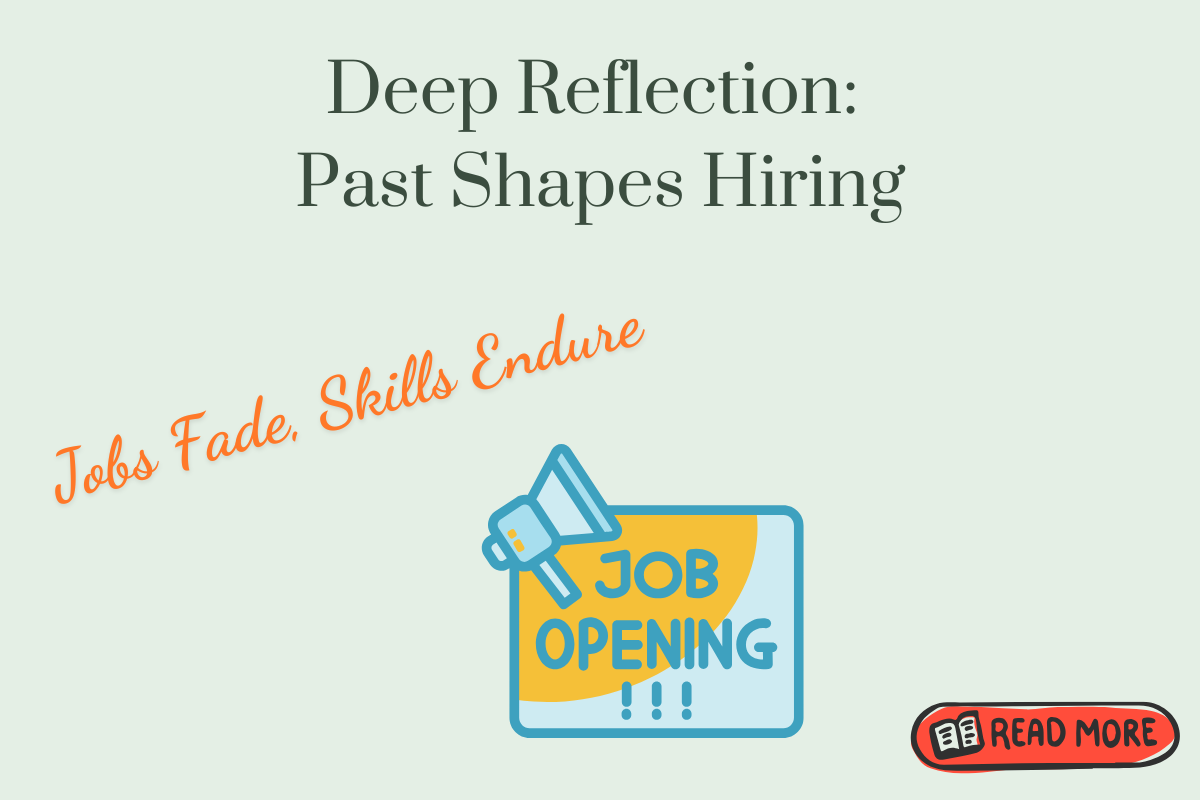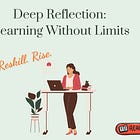Deep Reflection Series 2.18 – The Future Workforce Dilemma #WorkCulture
Balancing Innovation, Inclusion, and Economic Reality

🖌️ The workforce of tomorrow is being shaped today. Traditional hiring models built on bureaucracy and credential-based filtering no longer fit a world defined by automation, remote work, and evolving job structures. While technology creates new opportunities, it also widens economic divides. The challenge is not just preparing workers for the future but redefining what work itself means.
This chapter explores the trends reshaping employment, the skills required to thrive, and the policies that must evolve to create a labor market that is both innovative and inclusive.
From Industrial Hierarchies to Workforce Fluidity
Hiring inefficiencies have shaped more than recruitment. They dictated job structures and access to opportunity. Today’s workforce is moving beyond these historical limitations.
Job hierarchies are dissolving as companies shift toward skills-based hiring and project-based work.
Technology is redefining roles, requiring continuous learning rather than fixed expertise.
Work is becoming decentralized, forcing organizations to rethink the employer-employee relationship.
These shifts bring both opportunity and risk. The future workforce can drive innovation and equity or deepen economic instability depending on how individuals, companies, and policymakers adapt.
Trends Shaping the Future of Work
1. Automation: Reshaping Work, Not Replacing It
Unlike past industrial shifts that eliminated jobs, today’s automation is creating new roles while transforming existing ones. AI and robotics now handle repetitive tasks, allowing workers to focus on judgment, creativity, and adaptability. The real challenge is not job loss but job mismatch. Workers must transition into new fields that demand human insight.
—Key shift— Automation is a tool, not a threat. Workforce readiness depends on reskilling.
➤ For Employers:
• Provide automation literacy training to integrate human-machine collaboration.
• Restructure roles to create upskilled opportunities instead of eliminating jobs.
2. The Shift Toward Fluid Work Structures
Full-time employment is no longer the default. Workers now move between full-time jobs, freelancing, and contract work based on economic conditions and personal priorities.
Hybrid and remote work have become the norm, reshaping how teams collaborate.
The gig economy is expanding, but outdated labor protections leave many workers without security or benefits.
—Key shift— Work is shifting from rigid roles to task-based, skills-driven models.
➤ For Policymakers:
• Implement portable benefits that follow workers across different employment types.
• Strengthen financial protections to stabilize gig work.
3. Skills-Based Hiring Over Credentialism
While 2.17 examined how credentialism became a hiring barrier, 2.18 highlights the ongoing shift toward skills-first hiring, where demonstrated ability matters more than degrees.
Major firms like Google, IBM, and Tesla have removed degree requirements.
Competency-based assessments, micro-credentials, and skills portfolios are replacing traditional résumés.
—Key shift— Hiring is moving from where you studied to what you can do.
➤ For Job Seekers:
• Develop a portfolio showcasing skills and practical experience.
• Engage in self-directed learning through bootcamps, certifications, and industry projects.
4. Inclusive Leadership for a Decentralized Workforce
Leadership today is no longer about overseeing employees in a shared space. Hybrid and global teams require trust, inclusivity, and cultural intelligence.
Effective leaders manage across time zones, diverse teams, and digital workspaces.
Success depends on relationship-building over micromanagement.
—Key shift— Future leaders must master collaborative leadership rather than hierarchical control.
➤ For Employers:
• Invest in leadership training for remote and cross-cultural collaboration.
• Shift from hierarchical structures to team-driven decision-making.
Preparing for a Workforce Without Borders
The workforce of the future will not be confined by geography, credentials, or traditional career paths. Workers will navigate multiple industries, companies will redefine employment models, and policymakers must modernize labor laws to prevent exploitation while fostering innovation.
For job seekers: Adaptability and continuous learning will determine career success.
For employers: Investing in human potential will drive long-term growth.
For policymakers: Regulations must balance flexibility and worker protections.
The future of work is not predetermined. It will be shaped by the choices we make today.
Looking Ahead
Technology alone will not define the future workforce. The real transformation depends on how businesses, workers, and policymakers respond to change. Our next chapter will explore Reinventing Educational Pathways, analyzing how learning models must evolve to equip workers with the skills, knowledge, and experiences needed in a rapidly shifting economy. analyzing how learning models must evolve to equip workers with the skills, knowledge, and experiences needed in a rapidly shifting economy.
🤔 What’s Next?
➤ Which emerging trends will have the greatest impact on the future workforce?
➤ How can workers future-proof their careers in an era of automation and remote collaboration?
➤ What policies or corporate strategies are essential for workforce equity and innovation?
Share Your Story:
➤ Have you experienced the shift toward skills-based hiring? What changed?
➤ Have you transitioned from a traditional career path to a flexible or digital work model? What challenges did you face?
➤ Have you encountered companies actively preparing employees for workforce trends? What stood out about their approach?
New to the series? Revisit The Cost of Hiring Dysfunction (2.16) to understand how broken hiring systems drain talent and innovation, or The Evolution of Hiring (2.17) to explore how history shaped today’s workforce.
👉 Follow ThinkZeit on Substack and tap the bell 🛎️ to stay connected without chasing noise. If this reflection made you pause, share it with someone who reads quietly but deeply.
—#WorkCulture— by Ellis Zeitmann for ThinkZeit
#WorkCulture #HiringParadox #EmployeeExperience #CareerGrowth #WorkplaceSurveillance #HRGhosting #AlgorithmicBias #DigitalPrivacy #ModernWorkplace #DeepReflections



